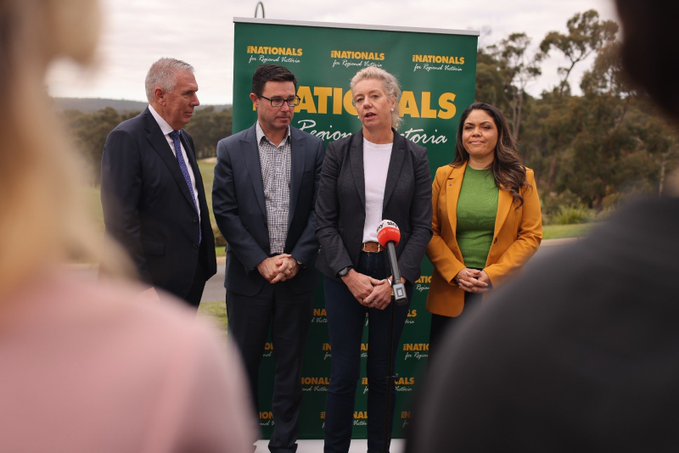The federal Nationals have joined their state-level counterparts in opposing the Indigenous Voice to Parliament as support for the referendum continues to decline.
Senator Jacinta Nampijinpa Price of the Coalition joined Nationals leader David Littleproud in publicly announcing the position of the Victorian Nationals on the voice issue. They were joined by Victorian senator Bridget McKenzie, Victorian Nationals Leader, and state opposition spokesman on Aboriginal matters Peter Walsh.
The statement comes at the start of National Reconciliation Week, a day after over 20 of Australia’s top sporting organisations formally expressed their support for the yes vote in an open letter to supporters.
Australia will not be united by the Voice, according to Senator McKenzie, but rather will be divided.
“Albanese’s Voice’s proposal will divide Australians along racial lines and have hidden repercussions,” she claimed. “I absolutely believe in recognition, reconciliation, and most importantly better outcomes for Aboriginal and Torres Strait Islanders.”
“Our Victorian Nationals have bravely stood today for a united Australia, and I am incredibly proud of them.”
Price, a senator from the Country Liberal Party, has led the No side throughout the referendum process.
She joined forces with Warren Mundine under the Fair Australia banner as they pressed their opposition to “the nation’s most divisive referendum we’ve ever had.”
On Saturday, Ms. Price stated that the situation was “racially charged, polarising, and harming our country.”
“Based only on race, we shouldn’t give one group of people’s needs top priority. Serving every Australian based on their individual needs is what we should be doing.
The idea that Australians as a race are intrinsically less fortunate than other people is discriminatory.
“The gap between those who are doing well in this country, including Indigenous people, and those who are marginalised,” says the author, “is not between Indigenous and non-Indigenous Australia.”
The federal Nationals declared their opposition to the voice last year, believing it would not benefit Indigenous people in their areas.
Victorians who oppose the voice, according to Senator Price, are not necessarily racist.
If you support a no vote in this country, you are not racist, she insisted.
“In fact, if you support a no vote, you are implying that Indigenous Australians are capable of anything and everything, not because of our race but rather because we live in a wonderful country that provides the opportunities for us,” the author says.
The Australian Electoral Commission (AEC) came under fire on Friday from Senators McKenzie and Price for their enrolment advertisements leading up to the vote, alleging a bias in favour of the yes campaign.
This was in response to remarks made by Warren Mundine on Thursday, who also charged the AEC of “crossing the line” over an advertisement that displayed an Australian map with Indigenous art designs in the background of First Nations people wearing shirts that read, “Our vote, our future.”
Senator Price says there is still more work to be done for the no argument, but supporters and advocates of the yes vote have an uphill struggle ahead of the referendum as support for the yes vote dwindles and recently dropped to just 53%.
“I’m happy to see the decline in the yes vote, but that doesn’t mean I’ll let up on my efforts. Australians are waking up, and they are not foolish, so that’s what it means.
The latest constitutional amendment in Australia was adopted in 1977, and just eight of the 44 suggestions for modification have been accepted.
Later this year, between October and December, a referendum on the Indigenous Voice to Parliament will be held.





